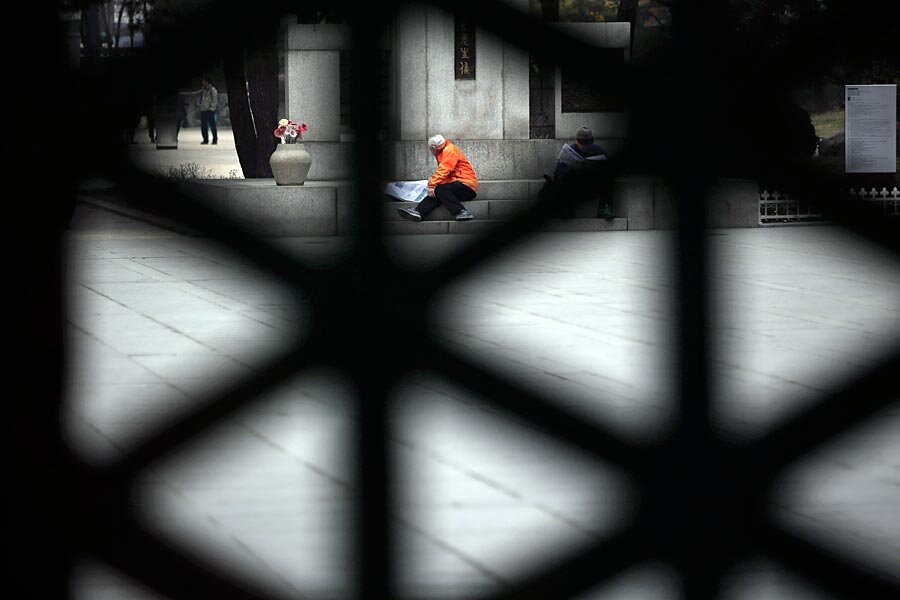Having built nation from scratch, elderly S. Koreans feel abandoned
Loading...
| Seoul, South Korea
Jeong Soon-ja spent a lifetime working and raising children as part of a generation that lifted South Korea from rural squalor and postwar ruin to become the world’s 15th largest economy.
Yet like many of her peers, Ms. Jeong lives in poverty and isolation. Too frail to work, her husband gone, her children seemingly disinterested, she survives on a government pension of about $200 a month, plus a monthly allotment of kimchi and rice from a district office in the gritty Seoul neighborhood of Gaebong-dong, which lacks the glitz of districts like Gangnam.
“When I was young, I should have saved money, but I had to feed, clothe and teach my children,” says the octogenarian, who sits on her haunches, a stance ingrained among older Koreans. She did laundry and maintenance work all her life and now has no pension, and says, “my money is all gone.”
Family ties weakening?
Jeong's situation is becoming more common among a generation given credit for aiding South Korea’s lightning rise to manufacturing and high tech prowess. A new government-funded study shows nearly half of South Koreans over 65 living in relative poverty as recently as 2011, in a society whose traditionally strong family bonds are weakening.
One of Jeong’s six children pays her rent and utilities. But in a culture that honors the elderly, she hasn't seen her eldest or youngest daughter in five years, and rarely hears from the others.
Almost half of elderly South Koreans earn less than 50 percent of the median wage, according to a March study from the Korea Labor Institute. That abysmal rate is the lowest of all countries in the Organization of Economic Cooperation and Development, and is twice the figure of second-ranked Switzerland. (In Japan, a recent study found nearly half of the 1.6 million Japanese living below the poverty line were elderly.)
In South Korea, most seniors in financial straits live alone. Whereas it was once common for three generations to live under one roof, about one in five elderly citizen now resides in a single-occupant household.
Low birth rate
“In the past, when a grandfather and grandmother, or a mother and father, taught their children, those children had a responsibility to support them because living all together like this was a help to everyone,” says Kim Hyun-mi, general manager of the government-affiliated Comprehensive Support Center for the Elderly Living Alone. “But now, you can see that support has weakened because they live separately.”
The challenge of providing for the old is particularly acute in South Korea, which has one of the most rapidly graying populations in the world, a consequence of a chronically low birthrate.
Jo Joon-yong, a professor of social welfare studies at the regional Hallym University, says that the elderly are projected to account for a quarter of the population by 2030, creating a potential future crisis for the welfare system.
“To maintain a social security system, you need a young generation to pay taxes and premiums for the social insurance system,” he says.
Amid the decline in filial piety in Korean families, the government has only marginally plugged the gap in support. Last year, South Korea had the lowest social spending of any OECD country.
President Park Geun-hye campaigned in 2012 on a pledge of introducing a universal state pension of about $200 a month. But that figure got scaled back to about $100-200 for the poorest 70 percent of seniors. Seniors who receive such benefits potentially lose out on separate, means-tested assistance for the poor.
Problems of living alone
The feasibility of more generous welfare schemes has been a political flash point between liberal and conservative politicians in a nation that is roughly divided along these general lines. Political gridlock may be slowing welfare reform, but more social spending in future appears inevitable, given the aging population.
“I think that because it is now in the beginning phase, welfare benefits for the old are insufficient compared to other countries, but in the future welfare benefits will be provided stably just like in advanced countries,” says Ms. Kim, the support center official.
Mental health, loneliness, and what Kim calls "emotional problems" are becoming more pressing concerns among elderly living alone, she says.
South Korea has the highest overall suicide rate in the OCED, and men aged 80 and above die by their own hand at almost five times the rate of those aged 30-39, according to government statistics.
Jeong, who speaks in loud, defiant bursts, insists she is satisfied with life. She regularly meets friends. But she also admits to being lonely.
Above all, she misses her daughters, who she has become convinced no longer love her. Even when she recently was hospitalized for an emergency, they did not visit.
“I really miss my daughters but they never contact me,” she says. “I miss my daughters the most. That’s the saddest thing."







